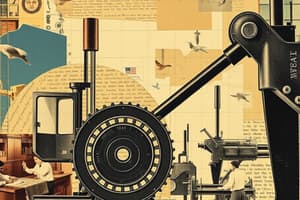Podcast
Questions and Answers
In a society with mechanical solidarity, why do individuals sacrifice their individual freedoms?
In a society with mechanical solidarity, why do individuals sacrifice their individual freedoms?
- For the common good (correct)
- To rebel against the collective conscious
- To gain personal benefits
- To challenge societal norms
What is a characteristic of the population in a society with mechanical solidarity?
What is a characteristic of the population in a society with mechanical solidarity?
- Population with varying occupations
- Homogenous population with shared histories (correct)
- Diverse population with conflicting beliefs
- Individualistic population without shared values
How does the weakening of collective conscience impact mechanical solidarity?
How does the weakening of collective conscience impact mechanical solidarity?
- It strengthens individual freedoms
- It leads to increased consensus in society
- It improves social norms and values
- It weakens the bonds that hold mechanical solidarity together (correct)
What type of economy was prevalent in smaller towns and villages during the pre-modern era?
What type of economy was prevalent in smaller towns and villages during the pre-modern era?
What is a key reason that mechanical solidarity may not be sufficient in modern complex societies?
What is a key reason that mechanical solidarity may not be sufficient in modern complex societies?
In a society characterized by mechanical solidarity, individuals are more likely to __________.
In a society characterized by mechanical solidarity, individuals are more likely to __________.
What is a distinguishing feature of the population in a society with mechanical solidarity?
What is a distinguishing feature of the population in a society with mechanical solidarity?
How does the weakening of collective conscience affect the functionality of mechanical solidarity in modern societies?
How does the weakening of collective conscience affect the functionality of mechanical solidarity in modern societies?
What role did shared histories and traditions play in societies with mechanical solidarity?
What role did shared histories and traditions play in societies with mechanical solidarity?
Why is it challenging for modern society to sustain mechanical solidarity according to Durkheim?
Why is it challenging for modern society to sustain mechanical solidarity according to Durkheim?
Flashcards are hidden until you start studying
Study Notes
Mechanical Solidarity
- In a society with mechanical solidarity, individuals sacrifice their individual freedoms for the sake of the collective good.
- A characteristic of the population in a society with mechanical solidarity is that it is typically small, rural, and homogeneous.
Weakening of Collective Conscience
- The weakening of collective conscience, which refers to the shared values and beliefs of a society, impacts mechanical solidarity by eroding the sense of community and shared identity.
- As collective conscience weakens, mechanical solidarity is compromised, and individuals may prioritize their own interests over the collective good.
Economy in Pre-Modern Era
- In smaller towns and villages during the pre-modern era, the prevalent economy was often based on agriculture, craft, and local trade.
Limitations of Mechanical Solidarity
- A key reason mechanical solidarity may not be sufficient in modern complex societies is that it relies on shared values and beliefs, which can be difficult to maintain in diverse, urbanized societies.
Individual Behavior
- In a society characterized by mechanical solidarity, individuals are more likely to conform to traditional norms and customs.
Population Characteristics
- A distinguishing feature of the population in a society with mechanical solidarity is its relatively small size and geographical isolation.
Impact on Modern Societies
- The weakening of collective conscience affects the functionality of mechanical solidarity in modern societies by making it challenging to maintain social cohesion and collective identity.
Role of Shared Histories and Traditions
- Shared histories and traditions play a crucial role in societies with mechanical solidarity by providing a shared sense of identity and community.
Durkheim's View
- According to Durkheim, it is challenging for modern society to sustain mechanical solidarity because of the increasing diversity, complexity, and individualization of modern societies, which can erode the shared values and beliefs that underpin mechanical solidarity.
Studying That Suits You
Use AI to generate personalized quizzes and flashcards to suit your learning preferences.




